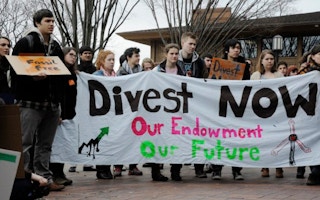European and Chinese scientists have identified a simple new way to become poor: fossil fuel investment. Not only could it leave you without a penny to your name. It could perhaps precipitate a global financial crash within one generation.
Coal, oil and natural gas are already huge investments. The International Energy Agency foresees price rises until 2040, and investor confidence is high. But researchers from the Netherlands, the UK and Macao don’t see it that way.
They warn in the journal Nature Climate Change that, whatever the markets think, and whatever governments do, change is on the way.
Other forces are now driving global power and transportation in directions that suggest a dramatic decline in demand for fossil reserves. These will become what the money markets call “stranded assets”, and their value will slump some time before 2035.
And this bursting of what researchers call “the carbon bubble”—a reference to a three-centuries old financial disaster known to historians as the South Sea Bubble—could wipe between one and four trillion US dollars off the global economy. The financial crash of 2008 was triggered by a loss of a mere $0.25 trillion.
“
“Our analysis suggests that, contrary to investor expectations, the stranding of fossil fuel assets may happen even without new climate policies”
Jorge Viñuales, Professor, University of Cambridge
The scientists base their conclusion on a computer simulation known by the migraine-inducing acronym E3ME-FTT-GENIE, which is short for Energy-Environment-Economy Macroeconomic-Future Technology Transformations Grid Enabled Integrated Earth.
They say it is the only such model that looks at the big picture: the macroeconomy, energy, the environment and global energy and transport systems according to both sector and geography.
Their argument is that the world is heading towards greater fuel efficiencies, renewable energy and low carbon technologies, whatever governments and the money markets may think.
In 2015, in Paris, 195 nations vowed to contain global warming—driven by greenhouse gases emitted from fossil fuel combustion – to “well below” 2°C above the historic levels. Economists and climate scientists have repeatedly warned that fossil fuels would be a bad bet.
There has been evidence since the Paris Agreement that national and international action so far taken is not enough: the world could be heading for at least a 3°C rise this century.
The implication of the latest study is that, unless the world faces this reality, and switches to low-carbon investments, the global economy could suddenly collapse.
“Our analysis suggests that, contrary to investor expectations, the stranding of fossil fuel assets may happen even without new climate policies. This suggests a carbon bubble is forming and is likely to burst,” said Jorge Viñuales, of the University of Cambridge, and one of the authors.
“Individual nations cannot avoid the situation by ignoring the Paris Agreement or burying their heads in coal and tar sands. For too long, global climate policy has been seen as a prisoner’s dilemma game, where some nations can do nothing and get a free ride on the efforts of others. Our results show this is no longer the case.”
$4tn time-bomb
There is a catch: suppose nations become aware of the danger. A sudden push to fulfil the 2°C promise, combined with declines in fossil fuel demand but continued high output of fossil fuels, could trigger a collapse that would wipe $4 trillion off the global balance sheets.
Canada, Russia and the US would see their fossil fuel industries collapse. Fuel-importing nations such Japan, China and most EU countries might gain, especially if they had invested in low-carbon technologies to create jobs and boost gross domestic product.
“If we are to defuse this time-bomb in the global economy, we need to move promptly but cautiously. The carbon bubble must be deflated before it becomes too big, but progress must also be carefully managed,” said Hector Pollitt, of the University of Cambridge, and another of the authors.
“If countries keep investing in equipment to search for, extract, process and transport fossil fuels, even though their demand declines, they will end up losing money on these investments on top of their losses due to limited exports,” said Jean-François Mercure of Radboud University at Nijmegen in the Netherlands, and of Cambridge, who led the study.
“Divestment from fossil fuels is both a prudent and necessary thing to do.”
This story was published with permission from Climate News Network.










